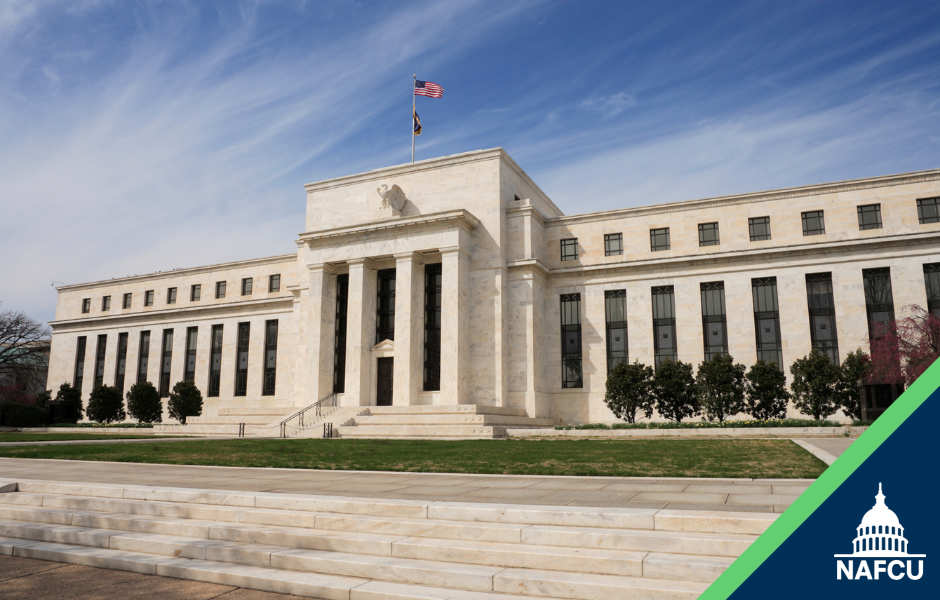Newsroom
Mesack says Fed’s interchange proposal is ‘misguided’
 The Federal Reserve Board of Governors met Wednesday and issued a request for comment on proposed revisions to the debit interchange fee cap under Regulation II. Under the Fed’s proposal, the interchange fee received by a debit card issuer for a debit card transaction would decrease from 21 to 14.4 cents, the ad valorem component – the number of basis points multiplied by the value of the transaction – would decrease from 5 basis points to 4 basis points, and the fraud-prevention adjustment would increase from 1 cent to 1.3 cents.
The Federal Reserve Board of Governors met Wednesday and issued a request for comment on proposed revisions to the debit interchange fee cap under Regulation II. Under the Fed’s proposal, the interchange fee received by a debit card issuer for a debit card transaction would decrease from 21 to 14.4 cents, the ad valorem component – the number of basis points multiplied by the value of the transaction – would decrease from 5 basis points to 4 basis points, and the fraud-prevention adjustment would increase from 1 cent to 1.3 cents.
“We firmly believe the Fed is misguided in its proposal to further reduce the interchange cap on debit transactions,” said NAFCU Senior Vice President of Government Affairs Greg Mesack. “Any reduction in interchange would undermine the financial stability of small credit unions, likely propelling a wave of consolidations within the financial sector. We vehemently disagree with the Board's assessment of the success of the small issuer exemption as well as its assessment of the proposed changes generally, which evaluates only a narrow subset of costs in order to evade more fulsome consideration of the total cost associated with operating card programs and addressing fraud
“With today’s proposal, consumers, particularly those in underserved communities, would see reduced access to financial services and higher costs for basic services. The Fed must reconsider this proposal and put consumers ahead of greedy merchants, who have proven they will use cost savings to line their own pockets."
Under the new system, the cap would be adjusted every two years, reflecting the most recent data that covered issuers report to the Fed. The proposed change aims to ensure that interchange fees remain fair, aligning with costs issuers incur for transactions, as mandated by the Durbin Amendment. The updated caps would be released without public commentary by March 31 in odd-numbered years, coming into effect July 1 of the same year, and would be applicable for two years.
In her statement, Federal Reserve Governor Michelle Bowman noted “nearly one-third of bank issuers would not be able to recover even the subset of costs that factor into the interchange fee cap, let alone those debit card program costs that are disregarded in the cap.” Bowman also pointed out “the costs for consumers—through the form of increased costs for banking products and services—will be real, while the benefits to consumers—such as lower prices at merchants— may not be realized.”
In addition, the Fed approved releasing the latest biennial report detailing data from large debit card issuers on interchange fees, issuer costs, and fraud related to debit card transactions in 2021.
NAFCU will continue to fight to protect interchange fees and other noninterest income to ensure credit unions can keep providing their members with safe, reliable, and affordable financial services. Of note, the NAFCU Board of Directors and senior association staff will share results of its annual Fed survey directly with Bowman and senior Federal Reserve staff during NAFCU’s annual meeting with the Federal Reserve in November – the association’s 30th year of meeting with the Fed.
Share This
Related Resources
Add to Calendar 2024-06-26 14:00:00 2024-06-26 14:00:00 Gallagher Executive Compensation and Benefits Survey About the Webinar The webinar will share trends in executive pay increases, annual bonuses, and nonqualified benefit plans. Learn how to use the data charts as well as make this data actionable in order to improve your retention strategy. You’ll hear directly from the survey project manager on how to maximize the data points to gain a competitive edge in the market. Key findings on: Total compensation by asset size Nonqualified benefit plans Bonus targets and metrics Prerequisites Demographics Board expenses Watch On-Demand Web NAFCU digital@nafcu.org America/New_York public
Gallagher Executive Compensation and Benefits Survey
preferred partner
Gallagher
Webinar
Add to Calendar 2024-06-21 09:00:00 2024-06-21 09:00:00 The Evolving Role of the CISO in Credit Unions Listen On: Key Takeaways: [01:30] Being able to properly implement risk management decisions, especially in the cyber age we live in, is incredibly important so CISOs have a lot of challenges here. [02:27] Having a leader who can really communicate cyber risks and understand how ready that institution is to deal with cyber events is incredibly important. [05:36] We need to be talking about risk openly. We need to be documenting and really understanding what remediating risk looks like and how you do that strategically. [16:38] Governance, risk, compliance, and adherence to regulatory controls are all being looked at much more closely. You are also seeing other technology that is coming into the fold directly responsible for helping CISOs navigate those waters. [18:28] The reaction from the governing bodies is directly related to the needs of the position. They’re trying to help make sure that we are positioned in a way that gets us the most possibility of success, maturing our postures and protecting the institutions. Web NAFCU digital@nafcu.org America/New_York public
The Evolving Role of the CISO in Credit Unions
preferred partner
DefenseStorm
Podcast
AI in Action: Redefining Disaster Preparedness and Financial Security
Strategy
preferred partner
Allied Solutions
Blog Post
Get daily updates.
Subscribe to NAFCU today.
